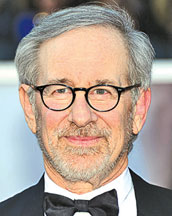Is Steven Spielberg right about an imminent movie industry meltdown?
When Steven Spielberg and George Lucas talk about movies, the entire
world listens. After all, these two directors defined the movie industry
for more than three decades, giving us such timeless classics as Indiana
Jones, Star Wars, E.T. and Jurassic Park. Yet Spielberg now believes
that the entire industry is headed toward a major "meltdown," and that
the current streak of bigger, louder and more expensive Hollywood
blockbusters is about to implode.
 |
|
Steven Spielberg |
Spielberg's criticism, backed by his friend George Lucas, is nothing
new to film critics, who have long claimed that directors like Michael
Bay have disposed of innovation in storytelling in favor of green screen
spectacles.
However, right after Spielberg's widely circulated comments, his
predictions started to come true.
Four very expensive films - The Lone Ranger, Pacific Rim, After Earth
and White House Down - all recently came up disappointingly short of
their production budgets. The rest of the summer looks bleak as well -
with the paranormal action film R.I.P.D. also forecast to be a bomb.
What happened? Did audiences suddenly lose interest in the
explosion-laden big-screen spectacles that have long defined summer
blockbusters? Or has the industry reached the saturation point predicted
by Spielberg and Lucas, and are these studios headed for a terrible fall
that will force them to rethink their movie-making strategies?
Canadian projector maker Imax has had a profound effect on movie
making over the past decade. Once restricted to projecting shorter
educational documentaries, Imax came out of its shell in the early
2000s, when its film-making process was modified to accommodate longer
running times.
This allowed the company to start showing mainstream Hollywood films
as well.
Meanwhile, James Cameron's Avatar, released by 20th Century Fox,
opened the floodgates for 3D films shown on an Imax screen.
In the four years since Avatar's release, the market has been
saturated with 3D Imax films. While some films, like Ang Lee's Life of
Pi, were able to fully utilise the medium to enhance its story, the
market, became crowded with critically panned 3D Imax cash-in films such
as Hansel and Gretel: Witch Hunters.
Theme park ride movies will displace traditional movies. In addition
to 3D Imax films, theatres are adding motion seats from D-Box
Technologies. Although this idea of a fully immersive motion picture is
good for movies that rely heavily on special effects, it has made
viewing non-action movies in theatres a thing of the past.
To Steven Spielberg, that's a major problem that undermines the
foundation of the film industry. He stated that his critically acclaimed
biopic, Lincoln, was nearly released on HBO instead of theatres, due to
the reluctance of studios to give the film a wide release.
Lucas also stated that he expects films like Lincoln to end up on the
small screen rather than theatres in the future.
Spielberg also believes that this obsession with 3D Imax and D-Box
style entertainment could cause average U.S. ticket prices to rise to
$25 in three years.
Marvel and The Walt Disney Company set the bar high for the rest of
the industry with The Avengers last year. Ever since the release of Iron
Man in 2008, the Marvel Cinematic Universe was pieced together so
lovingly and carefully that fans eagerly anticipated every new film in
the series. Joss Whedon, a man known for his passion for comic books and
sci-fi, was brought it to tie it all together with The Avengers, and the
result was a critical masterpiece with a score of 92 percent on Rotten
Tomatoes, which also became the highest-grossing film in 2012, at $623
million.
Despite achieving huge success with The Avengers and Iron Man 3,
Disney failed to learn a crucial lesson from its past failures. Last
year, Disney released John Carter, based on a 1912 novel by Tarzan
writer Edgar Rice Burroughs. The film cost $250 million to produce but
only grossed $282 million worldwide. Disney then followed that
disappointing film up with this year's The Lone Ranger, which cost $225
million but has only generated $147.5 million in global box office sales
to date.
Both films were unsuccessful, desperate attempts at launching a new
franchise to follow up The Pirates of the Caribbean, which generated a
combined a $4.7 billion in revenue over the course of four films between
2003 and 2011.
After the failure of The Lone Ranger, Disney should finally realise
that it needs to stop digging in the past and rebooting extremely dated
characters. Instead, all it needs to do is rely on the growth of the
Marvel Cinematic Universe and its upcoming Star Wars films to carry its
film studio division.
- yahoo.com
|


